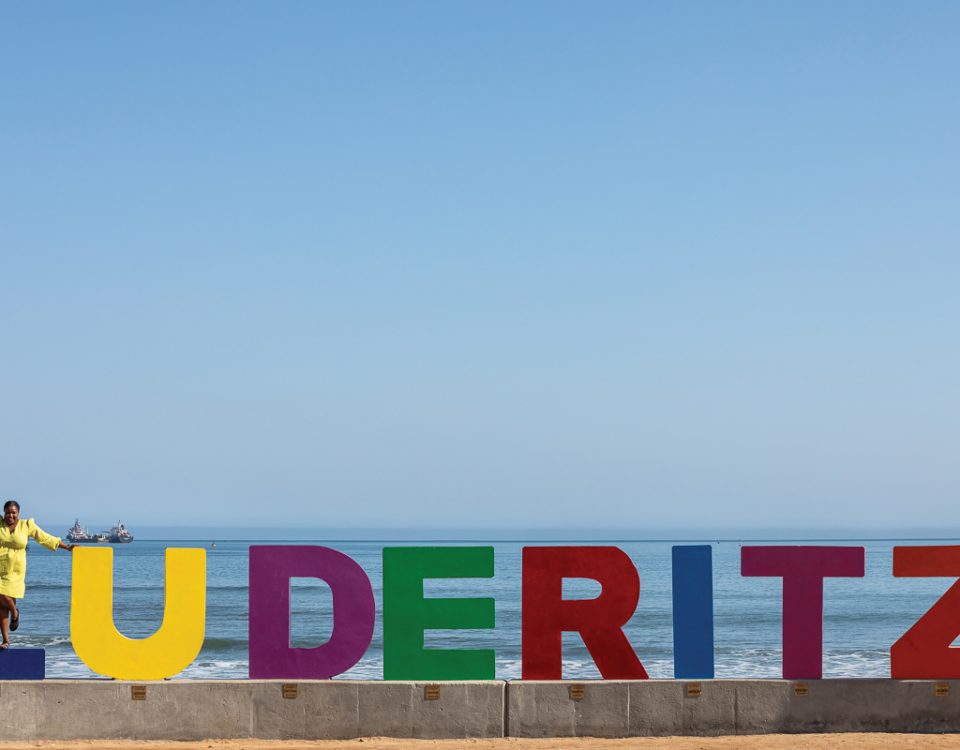Fashion Pambili Young Designers
October 15, 2013Desert lion targets second river visit to Angola
October 16, 2013Text and photographs Ed Jenkins
In 1983 the !Ikhoba Textile Project was born on a farm near Otjiwarongo in north-central Namibia. For almost three decades, !Ikhoba has provided employment to women who would otherwise not have had the opportunity to enter the workforce. Over the years, the project has had a hugely positive influence, bringing dignity and empowerment to a frequently overlooked segment of society – the wives of farm workers
The art of embroidery was introduced to the women of Namibia by the wives of Christian missionaries in the late nineteenth and earlier twentieth centuries. They soon made the art their own, moving from traditional European designs to works that were distinctively African in subject matter and, particularly, in colour.
Heide Lacheiner-Kuhn and her sisters Karin and Ute grew up on their family farm in Namibia, where they became fascinated with the beautiful embroidery being created by the wives of their farm workers, which the women sold at monthly street markets in Windhoek. The pieces were in great demand, and always sold quickly.
As children, the Lacheiner sisters learned and shared embroidery techniques with the women. As adults, they realised that by nurturing this creativity and building a year-round market for these pro-ducts, they could help make a difference that would enhance the quality of the women’s lives.
“It allowed them to become financially self-reliant, while working from home,” explains Heide. “These women were empowered in ways that other farm wives weren’t.”
Participation in the project grew rapidly, as family members and close friends of the original embroiderers began learning the craft. In the beginning, most designs reflected a nature or wildlife theme. The San name of the project, !Ikhoba, can be translated as ‘wild animals of Africa’, or possibly as ‘gemsbok’. The exclamation mark in front of the name represents the distinctive ‘click’ sound characteristic of the San language.
The project approached its peak in 2000, when as many as 400 women were producing embroidery. “For quite a few women, the !Ikhoba Project was the only thing they had. It started with a few families, so it’s almost like a kin relationship, and people felt it was important to belong to the so-called !Khoba people,” says Heide. “Each woman is an independent contractor, working at her own pace, usually from her own home.”
The embroidery pieces created by the women were brought to Heide’s family farm, where they were sewn, washed and finished to create wall hangings, tablecloths, cushion covers, table mats, T-shirts, bags, potholders, towels and bedspreads. “Our designs are based on traditional art, and the fabrics we use are 100% cotton and machine washable,” she explains. These finished products were marketed to the public through several outlets, including the Namibia Craft Centre and Africa Chic in Windhoek, and later !Ikhoba Creations in Swakopmund.
In 2005, Heide moved the pro-ject headquarters from the farm to Swakopmund. The women in Otjiwarongo continued to provide much of the embroidery, which is now finished and washed at the coast before being sent off to selling outlets. At present, about 350 women continue to work in Otjiwarongo. Six new staff positions were opened at the coast for sewers and ironers. Staff members also have the option of doing piecework in their own time. About 40 new embroiderers have joined the project since the move to Swakopmund, most coming from northern Namibia to seek work, and now providing the sole financial support for their families, who gene-rally live in the north.
Over the years, the Lacheiner sisters have continued their involvement with the !Ikhoba Project. Karin Kehrmann handles regional marketing, and sells !Ikhoba crafts at the Namibia Craft Centre, and through Africa Chic in Windhoek. She also owns her own shop in Swakopmund, !Ikhoba Creations. Ute Maugham-Brown, who now lives in England, handles European marketing.
Heide has continued managing the !Ikhoba project. In December 2010 she opened her own crafts shop in Hendrik Witbooi Street in the heart of downtown Swakopmund, where she continues in her family’s tradition of offering unique Namibian crafts created by Namibian artists.
The shop’s name, Meme !Ikhoba, reflects the multicultural society of Namibia. Meme is an Owambo word translated as ‘mother’, ‘wise woman’, or ‘respected lady’, while I’Khoba is a Europeanised version of !Khoba, and reflects the shop’s roots in the textile project.
In addition to embroidered items, Heide has added some new products to the Meme !Ikhoba inventory, including papier-mâché donkey carts, Christmas decorations, and large animal sculptures made from wire and fabric. Like the embroidery, all are exclusively Namibian. “We use recycled materials whenever possible,” says Heide. “Our most popular toys are the traditional Damara dolls, made entirely from scraps of material.”
At the !Ikhoba Project workshop in Swakopmund’s Industrial Area, sewers and ironers create the finished products for shipment to all the sales outlets. Ludia Heibes – a tall woman with a quiet dignity – methodically irons the products before shipment. Busy at several tables are sewers, such as Tabea Matheus, whose 11-month-old son, David, plays on the floor nearby. Her husband is also a !Khoba employee. Aune Amoonga takes a break from her sewing to talk. She explains that she began working for the !Ikhoba Project about four years ago, after graduating from a Youth Centre training course, and that the job allows her to support her 10-year-old daughter and 10-month-old son, who live with her family in the north. She hopes to become a designer one day, and states simply, “This job has given me a better life.”
CONTACT: ikhoba@iway.na
Flamingo - June 2011




